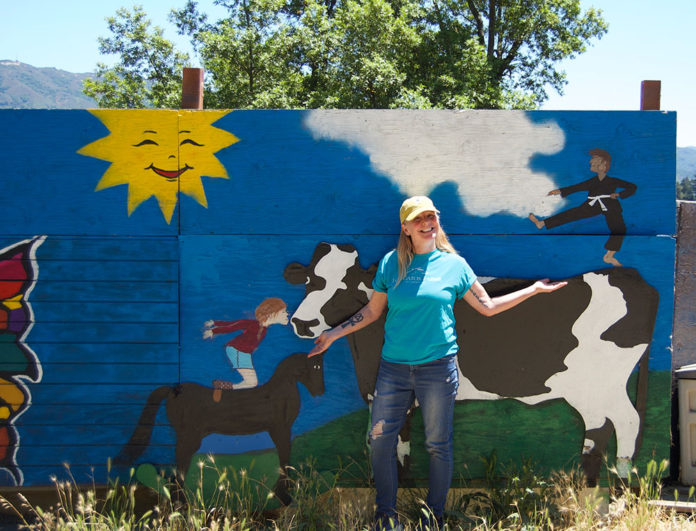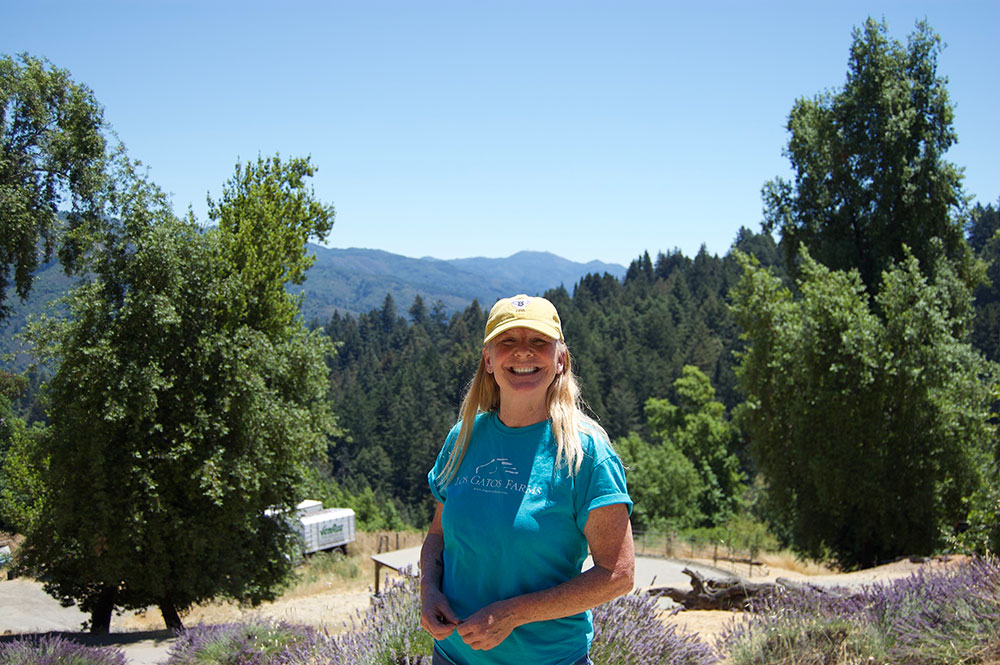
Motorists who navigate the curves of Highway 17 will pass by a handmade sign, right before reaching Summit Road in Los Gatos, that offers lavender for sale. Those who stop will find that for just $10 or $20, they can even get out of their cars and cut their own stalks to get the full olfactory experience.
But there’s much more than fresh-cut lavender to be found here. Since she purchased the property in 2000, Toni Kent has been the owner of Los Gatos Farms. Over 25 years, she has tended to the lavender bushes and offered stables for horse owners and space for children’s camps. It’s a sanctuary for members of the mountain community but also a piece of land that overlooks the vastness of the redwood mountains that surround Los Gatos.
The “U-Cut Lavender” acts as the initial attraction to passersby, Kent says, and she uses a plain and hand-written sign because she wants people to get a feel for the rawness of her farm.
Kent initially began offering her land in 2000 as a place to board horses and take riding lessons. Shortly after that came horse summer camps, while she was working in the mortgage business. In 2008, during the recession, she left that business because she saw she was making more money at the farm.
In 2003 she was cultivating 1,200 plants; now, there are 70 plants left, with the “U-Cut” business active on the weekends in July and August. The lavender can be used to make oil and medicinal teas.
Horse Sense
Working on this story was not the first time I had visited Los Gatos Farms. When I first graduated college in 2015, I ended up there for a brief time while I was working odd jobs around town. In a little over my head at the time, I would wake up at 5am each morning to be at the farm no later than 6am, spending most of my day shoveling manure from the stalls for the horses. Though it was a brief stint, I still remember the smell of the stalls, and the experience was one that shaped me.
Kent says she keeps a quote on her wall that serves as a reminder to herself: “Opportunity is missed by most people because it comes dressed in overalls and looks a lot like work.” She cites this quote because she says that maintaining the farm over the years has been very hard but it has also been very rewarding—and she is thankful for this life experience.
Kim Wasson has been coming to the farms for six years. Though she lost one of her horses—her beloved Jenn—she still boards two horses there. A resident of Redwood Estates, Wasson says, “it’s all about the horse and the connection to the horse. It is exercise, it is therapy, it is my social life. I think you don’t know that you miss it.”
Wasson has written a book, “The Socially Intelligent Project Manager,” published at the start of the pandemic, that she describes as mapping things through metaphors of horses. It is not just for project managers, she says, but also for anyone who wants to see how nature is mirrored inside of everyone, and how it can act as an internal compass.
According to Kent, everything that you learn in working with a horse can be applied to humans. She explains that her love for the land she oversees provides constant life lessons.
A Labor of Love
When first entering the road off of Highway 17, I pass by a children’s summer camp where participants learn about archery, blacksmithing and survival skills. The summer camps, which enroll children from 5 to 13 years old, occupy an additional 20 acres of land attached to Kent’s acreage and are owned and run by a couple named Ben and Claire.
These overlapping lands both serve as destination points for connection: spaces for adults seeking to interact with horses and for children exploring their relationship to nature.

“Our claim to fame is our kids’ summer camps,” Kent says. “I always wanted a place for horses and kids, as it’s what I didn’t get to experience as a kid.”
Her land totaled 20 acres when she made the initial purchase and now it has grown to 30 acres. In terms of its future, Kent wants to preserve it as a place for animals and children.
Kent says she’s a horse girl and farmer at heart, and her mission is to show that people will find her when the time is right without any advertising other than her handmade sign off of Highway 17, which she says she keeps it that way by design. And visitors must be prepared to embrace the experience with confidence: “Like, I could do that—I understand this, and I could be with a horse. If they have that feeling, look at all that wakes up inside of them.”
Kent also says that if a duck bites someone on the farm, it’s a lesson to the human and not the animal—an opportunity to learn boundaries and a display of hierarchy from nature.
As she looks back on the last 25 years of running Los Gatos Farms, Kent says that she wants people who come there to leave feeling like they can do more. Visiting a place like Los Gatos Farms can be a reminder for anyone who wants to understand where we come from and how important it is to connect to nature.









